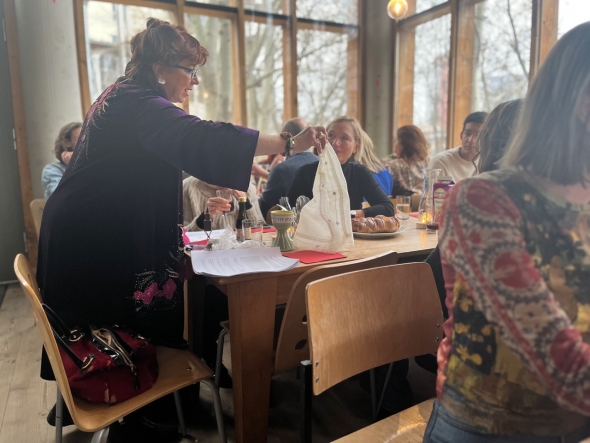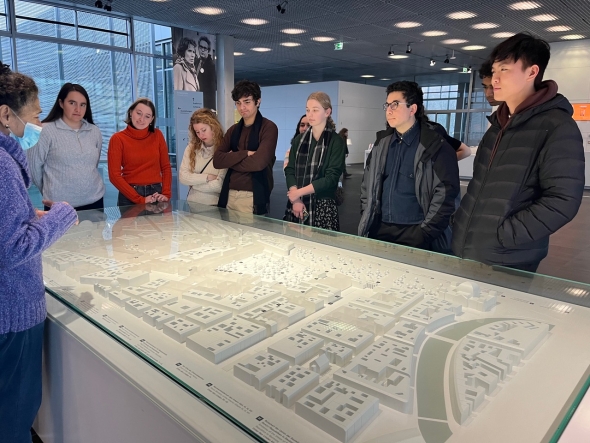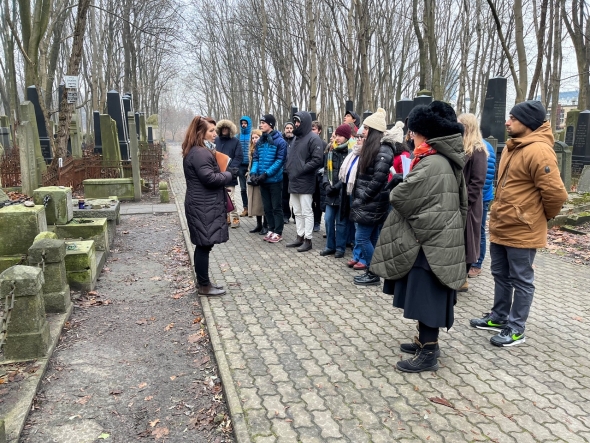
- About
- Departments & Programs
- Faculty Resources
- Governance
- Diversity
- News
Back to Top Nav
Back to Top Nav
Back to Top Nav
Back to Top Nav
A new seminar immerses students in Berlin's vibrant Jewish community and reckoning with the past.
In the decades following the Holocaust, many Jews refused to visit Berlin. But in recent years, the city has become home to a large contingent of Jewish artists and writers and welcomes over 50,000 Israeli tourists each year.
Immersing themselves in the complicated history and vibrant culture of Jewish life in Central Europe, 24 students traveled to Berlin during winterim with Susannah Heschel, the Eli. M. Black Distinguished Professor of Jewish Studies and chair of the Jewish Studies Program, and Veronika Fuechtner, associate professor of German studies and comparative literature.
The three-week Fall Term Plus program, during which the students lived with German host families, was the culmination of Migration and Memory, a one-credit intensive joint foreign study seminar offered, for the first time this year, by Jewish Studies and German Studies, through the Frank J. Guarini Institute for International Education.
"My field is German-Jewish history in the 19th and 20th centuries, so this is right in my area of expertise," says Heschel. "At the foundation of this course are questions of liberalism and emancipation, how Jews could fit into Germany in one way or another and create a new kind of identity, and how Judaism itself had to be reconfigured—and was reconfigured" before Hitler came to power in 1933.

During fall term, to prepare for a jam-packed itinerary of discussions, films, theater, and visits to museums and monuments, students tackled a wide variety of reading assignments, which they discussed at four on-campus meetings. Once in Europe, they also attended classes and lectures arranged by Heschel and Fuechtner at Dartmouth's partner university, the Freie Universität Berlin. Students interacted with scholars and curators as they discussed the history and present-day ramifications of racism and antisemitism. Among others, they met the poet Claudia Rankine, the documentary filmmaker Christophe Cognet, and the writer Esther Dischereit.
Fuechtner says some of the most important learning happened outside classrooms, in the homes of host families and during informational field trips, including to a Nazi death camp.
"Students noted the different ways history was conveyed by the German guides as opposed to Polish guides. This is something they really picked up on—what our practices of memorialization are, in general, and how they are culturally and historically contingent," says Fuechtner.

It's not necessary to speak German to enroll in this course, which is open to all students. Manu Onteeru '24, from Virginia, holds a double major in biology and gender studies. He decided to go to Berlin as a follow-up to a Dartmouth Hillel-sponsored trip he took last year to Poland.
"The primary goal of that one, called Project Preservation, was to educate us about Jewish history and the Holocaust, which was quite impactful for me because I didn't know a lot about Judaism as a religion and cultural practice," he says.
Onteeru says he bonded easily with his German host family.
"My host father is the editor-in-chief of a literary magazine, and my host mother works for the press office at the university, so they were very tapped into humanities circles in Berlin," he says. "I learned a lot because both of them had grown up in Germany, and we talked often about Holocaust remembrance and memory policies. Some are mandated by the state, but there are also other things that the population believes they should be doing in order to commemorate horrors."
Migration and Memory has been the best class he has taken at Dartmouth so far, says Onteeru.
"Having the opportunity to live with families and explore so many places was a powerful way to be immersed in an area of study. For example, when we were visiting the Jewish Museum, there was a compelling exhibit, where you could hear a son's recording of memories from his mother who had survived the Holocaust. You felt present in that story, with the audio surrounding you."
With a major in Film and Media Studies and a minor in Middle Eastern Studies, Katie Orenstein '22 signed up for Migration and Memory to learn how her culture as an American Jew differs from the experiences and histories of people living outside the United States, and how those experiences vary greatly, from one country to the next.
Being "obsessed with Broadway musicals," Orenstein saw a lot of theater in Berlin, which, she learned, has always been, and continues to be, a dynamic melting pot.
"There are Germans, there are Jews of Soviet origin, there's a huge population of people who came from Turkey beginning in the 1960s, and there's a debate raging in German politics about whether they and others can all be fully integrated into German citizenship. Also, a continuing influx of people who identify their nationality as Israeli, but who would rather live in Berlin."
But history has left visible scars on the landscape. The group made an emotional stop at Treblinka, a Nazi extermination camp northeast of Warsaw.

"Treblinka's main purpose was to kill a million people a year, but it was destroyed a year before the war ended. There are no historic buildings to see now, just a wide-open field with a memorial in the center," Orenstein says.
In contrast, one of the last places she visited, the 1936 Olympic facility built by Hitler, is "basically in perfect shape. They took down the swastikas, but statues of 'the perfect Aryan man' are still up and now it's used as a sports facility. Part of it is being turned into a museum, and through a Dartmouth connection, we got to talk to curators."
All in all, Orenstein says, the trip raised fundamental questions about the relationship between migration and memory, the definition of nationality, and the roots of her own identity.
"Walking through the Olympic facility reminded me of this quote that I read, to the effect of, 'You don't really feel your Americanness in America.' This is why everyone should study abroad, because when you go somewhere else, when you experience a different way to live, you also learn about your own country and about how other people perceive it."